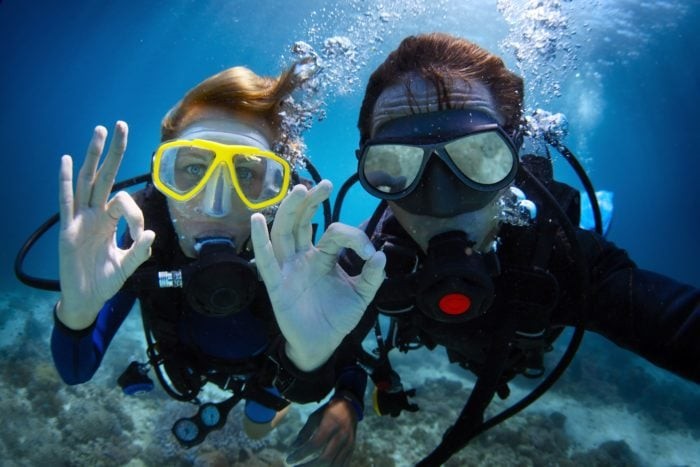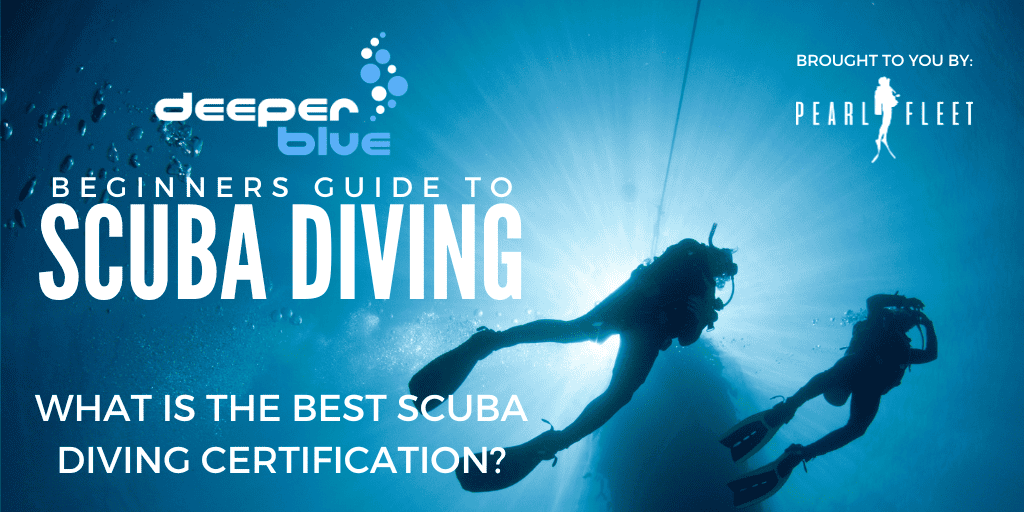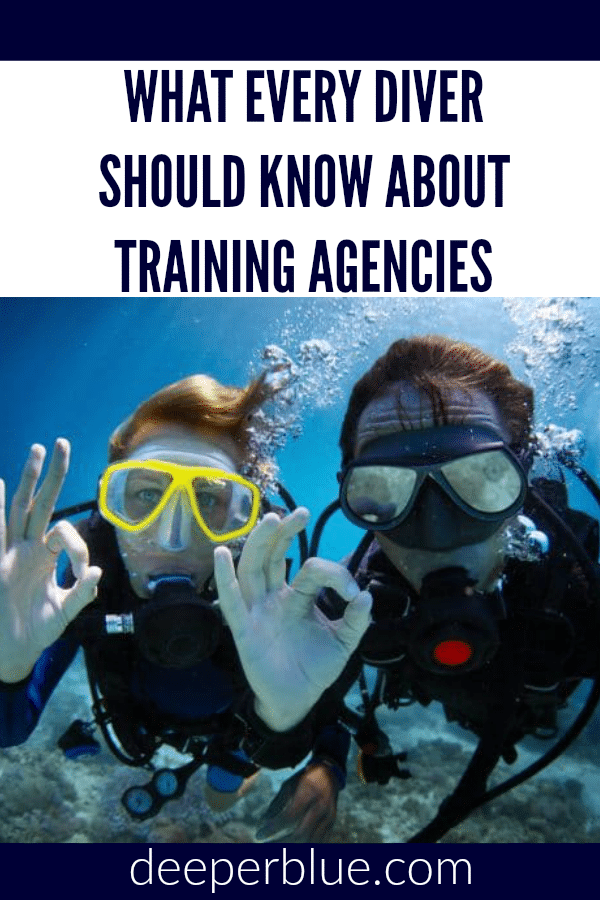This article is part of the Beginners Guide to Scuba Diving
What is better, a Ford or a Chevy? That debate has been going on for over a hundred years and will likely still be going on a hundred years from now. On scuba diving message boards and dive boats around the world, you will find a similar debate about “what is the best scuba diving certification?”.
What Scuba Diving Training Agency Is The Best?
While the Professional Association of Diving Instructors (PADI) is the largest scuba diving certification agency in the world, it is not the only one. A few agencies have certified around 90% of all recreational diving certifications in the world, still, there are 100’s of other agencies out there.
So it begs to question, who do I train with and how do I know I can use it everywhere.
The Worldwide Accreditation Myth, Sort Of
It is a common misconception that there is somewhere one authority that oversees scuba diving certification, and that authority grants worldwide acceptance of C-cards. That is not the case, worldwide acceptance is based on agreements between agencies.
Before the commercialization of divers training, C.M.A.S. was the default worldwide scuba diving certification agency. Spearheaded by its first president, Jacques-Yves Cousteau, The Confédération Mondiale des Activités Subaquatiques “C.M.A.S.” (in English The World Underwater Federation) was founded in 1959.
It’s 11 founding federations each representing a country, organized to promote underwater sporting events. Their mission also involved research and technical advancements in sports. C.M.A.S developed the first scientific-based diver training program. The organization now comprises over 130 federations from 5 continents and issues certifications to divers who complete a federations training program. All the current commercial training programs are based on the finding and procedures developed by C.M.A.S. This common history of training has encouraged different agencies to accept each other’s certifications.
In recent years, the International Standards Organization (ISO) has created standards for recreational diver training. These standards are also based on C.M.A.S programs. External auditors have been formed to examine applicants for an ISO accreditation in scuba diving. The European Underwater Federation and RSTC (Recreational Scuba Training Council) are the two largest. These organizations and the ISO standards have to lead to further cooperation between training agencies.
The major scuba diving certification and training agencies
If you are at a dive show or dive resort you’ll often hear conversations like “Is PADI or SSI better” or “which is better PADI or NAUI”. There is no one right answer.
When looking for information to help you decide which training agency is right for you, it is best to start with the major agencies. In the United States Scuba retail market, a study published in 2000 showed that 98.2% of the retailers were affiliated with PADI, NAUI, and SSI. The remaining 1.8% was shared by 20 small agencies.
The major training agencies all follow the ISO standards or the European equivalent. Two ISO standards are most relevant to those looking to become certified: Diver Level 1 – Supervised Diver ISO 24801-1 and Diver Level 2 – Autonomous Diver ISO 24801-2. These correspond to the Scuba Diver Certification and the Open Water Diver certification.

To get you started we will overview five training organizations that issue scuba certifications:
- Professional Association of Diving Instructors (PADI) – PADI is the undisputed leader in recreational scuba diving training. While statistics vary, it is estimated that PADI has certified between 60-75% of recreational scuba divers worldwide. Their course spans the entire range of recreational diving from open water certification all the way up to some technical diving, as well professional courses such as dive instructor or the pinnacle of professional certifications – Course Director. Businesses such as dive centers, dive resorts even boats can register with PADI to become affiliated. They will market them using their website as well as the dive travel company that is a part of PADI. Under the PADI system, instructors are basically a freelancer or independent contractor. They carry their own liability insurance and can work independently of any dive center or resort. PADI is instructor orientated. The certification process is between the instructor and the PADI headquarters.
- Scuba Schools International (SSI) – SSI has grown to be the second-largest scuba diving training agency. They also have a scope of training similar to PADI that ranges from open water certification all the way up to technical diving certification. While PADI is an organization of scuba diving instructors, SSI is a network of schools. SSI approves the association of a dive center or a resort. The schools, in turn, hire instructors. When a student completes their scuba certification, it is the dive center that approves it and issues the scuba certification. SSI believes their methods ensure that instructors are kept up to date on new procedures and advances in the industry. They also believe that the process is better quality control over the training than the independent methods of PADI. The SSI C-card has a place for a dive recognition sticker. When a diver reaches a certain milestone of a number of dives, a sticker is added to his card. After 100 dives, the diver is issued a Century diver card. Cards are also upgraded at 500,1000 and 5000 dive milestones.
- National Association of Underwater Instructors (NAUI) – NAUI was the second-largest agency before SSI took over that slot. They are a non-profit corporation, one of the oldest agencies issuing diving certification, but, they keep a low profile. It is not surprising to hear people ask if they are still in business or have merged with someone. They are very much in business and still going strong in their niche. Most NAUI training is aligned with academic organizations. NAUI divers are generally better trained and have a deep scientific understanding of diving. It seems to be the agency of choice for marine-related scientists.
- Rebreather Association of International Divers (RAID) – The Rebreather Association of International Divers (RAID) has been around for many years but in reality unknown to most recreational divers. Until 2014, RAID was for the technical scuba diver. Now it covers the entire field of open water certification as well as their well-known technical diving. While the other agencies look to add on new training and skills to their offering, RAID took another approach. Starting with their excellent rebreather training programs, they reversed engineered what skills were needed at the levels leading up to the technical programs. The company recruited the best in the industry to build new open water certification classes from the ground up while following the ISO requirements. RAID has designed its scuba certification to be interactive with digital media. They fully embrace digital learning, hard copies of the training material are not available. RAID uses the three segments as the others do, theory, confined water, and open water. The theory is more in-depth and has been called old school, which many professionals applaud. Unlike the others, all theory is to be completed before the confined water. The confined water process is about twice as long as others, with a minimum of four hours underwater. The open water is four dives but must total more than three hours. Their program is integrated from scuba diving up to technical and rebreather divers. The importance of critical skills such as buoyancy control is introduced and refined in the initial training and not as an added package. RAID also requires instructors to work for an accredited center.
- British Sub-Aqua Club (BSAC) – The British Sub-Aqua Club (BSAC) is as the name implies primarily is in the U.K., where it is still the largest trainer. It is similar to the concept that the YMCA had. It is social as well as diving, with club members getting together for a training session at a pool in poor weather. The club concept includes skills development and club members will do local dives together and often organize club trips. Training is done by instructors who are local members. The BSAC Ocean Diver student will purchase a training package that includes manuals and other materials needed. The cost is currently 32 GBP. The diver will pay the club a small fee for the air and any other expenses incurred. The instructor volunteers their time. The program has the theory portion, five pool dives, and five open water dives.
- Scuba Diving International (SDI) – Scuba Diving International (SDI) is a great choice for scuba diver that ultimately want to pursue a technical scuba dive certification. SDI is part of International Training, a group of diving organizations that includes Technical Diving International (TDI) – the world’s largest technical training agency. In fact, SDI was founded in 1998 as TDI’s recreational diving division and as such has close connections to the technical diving community. Many SDI instructors are also TDI instructors giving them the ability to teach basic skills which can translate well into future courses within this field. SDI has training centers in more than 100 countries. The entry-level scuba dive certification – Open Water Scuba Diver – involves a combination of theoretical e-learning, pool sessions, and open water dives.
What Should I Look for When Choosing a Scuba Certification Program?
Choosing the right scuba diving certification program is very important to your safety and enjoyment of the sport. There are a lot of factors that go into choosing one, but there are some key things you should consider before making your final decision.
Normally you train with the nearest dive centers and whatever certification is offered there.
If you have a choice, things to consider include: What type of diving (recreational, technical, rebreather, etc..) do you want to be certified in? How long will the course take and how much does it cost per day/weekend session? What are your time constraints, such as work or school schedules that might make this difficult for one reason, and what the diving course you want to do covers?
How Much Does a Scuba Certification Program Cost?
The cost of getting scuba diving certifications differs from one program to the next. Some programs are free, while others can cost up to several thousand dollars. However, the average cost for an entry-level course in the United States is around $600.
What Qualifications or Documents Do I Need to Become Scuba Certified?
Most scuba certification programs have a list of prerequisites for those wanting to sign up for an entry-level diving certification. This list usually includes a valid driver’s license, CPR certification, and an understanding of basic scuba diving terminology.
A few programs also require that you be at least 18 years old although some agencies have specific scuba training courses for students from 8 years old normally called “bubble maker” and “junior” courses from 10 or 12 years old.
You must also complete a medical questionnaire and in some cases even consult with a physician. Some agencies also require that you have a certain level of swimming ability. This is because scuba diving requires the use and development skills of skills that a good proficiency in the water will help with.
Finally, you will also need to purchase a personal set of learning materials.
While there are many other choices, these agencies are the largest and recognize each other’s programs. You can dive just about anywhere.
Click here for more articles in the Beginners Guide to Scuba Diving
Brought To You By
Our Beginners Guide to Scuba Diving is brought to you by Pearl Fleet. Pearl Fleet invites you to embark on their exquisitely crafted yachts for the finest diving experience the world has to offer. From purposefully designed diving itineraries to high-class amenities, Pearl Fleet’s immersive getaways allow you to indulge in your passion as you journey to world-class diving destinations. You can find out more at pearlfleet.org.




Comments are closed.